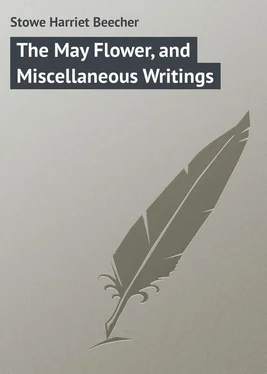Harriet Stowe - The May Flower, and Miscellaneous Writings
Здесь есть возможность читать онлайн «Harriet Stowe - The May Flower, and Miscellaneous Writings» — ознакомительный отрывок электронной книги совершенно бесплатно, а после прочтения отрывка купить полную версию. В некоторых случаях можно слушать аудио, скачать через торрент в формате fb2 и присутствует краткое содержание. Жанр: foreign_prose, на английском языке. Описание произведения, (предисловие) а так же отзывы посетителей доступны на портале библиотеки ЛибКат.
- Название:The May Flower, and Miscellaneous Writings
- Автор:
- Жанр:
- Год:неизвестен
- ISBN:нет данных
- Рейтинг книги:4 / 5. Голосов: 1
-
Избранное:Добавить в избранное
- Отзывы:
-
Ваша оценка:
- 80
- 1
- 2
- 3
- 4
- 5
The May Flower, and Miscellaneous Writings: краткое содержание, описание и аннотация
Предлагаем к чтению аннотацию, описание, краткое содержание или предисловие (зависит от того, что написал сам автор книги «The May Flower, and Miscellaneous Writings»). Если вы не нашли необходимую информацию о книге — напишите в комментариях, мы постараемся отыскать её.
The May Flower, and Miscellaneous Writings — читать онлайн ознакомительный отрывок
Ниже представлен текст книги, разбитый по страницам. Система сохранения места последней прочитанной страницы, позволяет с удобством читать онлайн бесплатно книгу «The May Flower, and Miscellaneous Writings», без необходимости каждый раз заново искать на чём Вы остановились. Поставьте закладку, и сможете в любой момент перейти на страницу, на которой закончили чтение.
Интервал:
Закладка:
"O, to be sure I will!" said our hero, looking up with a very intelligent air; and so, as Aunt Sally would say, the matter was settled, with "no words about it."
Now shall we narrate how our hero, as he saw Uncle Lot approaching the door, had the impudence to take out his flute, and put the parts together, arranging and adjusting the stops with great composure?
"Uncle Lot," said he, looking up, "this is the best flute that ever I saw."
"I hate them tooting critturs," said Uncle Lot, snappishly.
"I declare! I wonder how you can," said James, "for I do think they exceed – "
So saying, he put the flute to his mouth, and ran up and down a long flourish.
"There! what do you think of that?" said he, looking in Uncle Lot's face with much delight.
Uncle Lot turned and marched into the house, but soon faced to the right-about, and came out again, for James was fingering "Yankee Doodle" – that appropriate national air for the descendants of the Puritans.
Uncle Lot's patriotism began to bestir itself; and now, if it had been any thing, as he said, but "that 'are flute" – as it was, he looked more than once at James's fingers.
"How under the sun could you learn to do that?" said he.
"O, it's easy enough," said James, proceeding with another tune; and, having played it through, he stopped a moment to examine the joints of his flute, and in the mean time addressed Uncle Lot: "You can't think how grand this is for pitching tunes – I always pitch the tunes on Sunday with it."
"Yes; but I don't think it's a right and fit instrument for the Lord's house," said Uncle Lot.
"Why not? It is only a kind of a long pitchpipe, you see," said James; "and, seeing the old one is broken, and this will answer, I don't see why it is not better than nothing."
"Why, yes, it may be better than nothing," said Uncle Lot; "but, as I always tell Grace and my wife, it ain't the right kind of instrument, after all; it ain't solemn."
"Solemn!" said James; "that is according as you work it: see here, now."
So saying, he struck up Old Hundred, and proceeded through it with great perseverance.
"There, now!" said he.
"Well, well, I don't know but it is," said Uncle Lot; "but, as I said at first, I don't like the look of it in meetin'."
"But yet you really think it is better than nothing," said James, "for you see I couldn't pitch my tunes without it."
"Maybe 'tis," said Uncle Lot; "but that isn't sayin' much."
This, however, was enough for Master James, who soon after departed, with his flute in his pocket, and Grace's last words in his heart; soliloquizing as he shut the gate, "There, now, I hope Aunt Sally won't go to praising me; for, just so sure as she does, I shall have it all to do over again."
James was right in his apprehension. Uncle Lot could be privately converted, but not brought to open confession; and when, the next morning, Aunt Sally remarked, in the kindness of her heart, —
"Well, I always knew you would come to like James," Uncle Lot only responded, "Who said I did like him?"
"But I'm sure you seemed to like him last night."
"Why, I couldn't turn him out o' doors, could I? I don't think nothin' of him but what I always did."
But it was to be remarked that Uncle Lot contented himself at this time with the mere general avowal, without running it into particulars, as was formerly his wont. It was evident that the ice had begun to melt, but it might have been a long time in dissolving, had not collateral incidents assisted.
It so happened that, about this time, George Griswold, the only son before referred to, returned to his native village, after having completed his theological studies at a neighboring institution. It is interesting to mark the gradual development of mind and heart, from the time that the white-headed, bashful boy quits the country village for college, to the period when he returns, a formed and matured man, to notice how gradually the rust of early prejudices begins to cleave from him – how his opinions, like his handwriting, pass from the cramped and limited forms of a country school into that confirmed and characteristic style which is to mark the man for life. In George this change was remarkably striking. He was endowed by nature with uncommon acuteness of feeling and fondness for reflection – qualities as likely as any to render a child backward and uninteresting in early life.
When he left Newbury for college, he was a taciturn and apparently phlegmatic boy, only evincing sensibility by blushing and looking particularly stupefied whenever any body spoke to him. Vacation after vacation passed, and he returned more and more an altered being; and he who once shrunk from the eye of the deacon, and was ready to sink if he met the minister, now moved about among the dignitaries of the place with all the composure of a superior being.
It was only to be regretted that, while the mind improved, the physical energies declined, and that every visit to his home found him paler, thinner, and less prepared in body for the sacred profession to which he had devoted himself. But now he was returned, a minister – a real minister, with a right to stand in the pulpit and preach; and what a joy and glory to Aunt Sally – and to Uncle Lot, if he were not ashamed to own it!
The first Sunday after he came, it was known far and near that George Griswold was to preach; and never was a more ready and expectant audience.
As the time for reading the first psalm approached, you might see the white-headed men turning their faces attentively towards the pulpit; the anxious and expectant old women, with their little black bonnets, bent forward to see him rise. There were the children looking, because every body else looked; there was Uncle Lot in the front pew, his face considerately adjusted; there was Aunt Sally, seeming as pleased as a mother could seem; and Miss Grace, lifting her sweet face to her brother, like a flower to the sun; there was our friend James in the front gallery, his joyous countenance a little touched with sobriety and expectation; in short, a more embarrassingly attentive audience never greeted the first effort of a young minister. Under these circumstances there was something touching in the fervent self-forgetfulness which characterized the first exercises of the morning – something which moved every one in the house.
The devout poetry of his prayer, rich with the Orientalism of Scripture, and eloquent with the expression of strong yet chastened emotion, breathed over his audience like music, hushing every one to silence, and beguiling every one to feeling. In the sermon, there was the strong intellectual nerve, the constant occurrence of argument and statement, which distinguishes a New England discourse; but it was touched with life by the intense, yet half-subdued, feeling with which he seemed to utter it. Like the rays of the sun, it enlightened and melted at the same moment.
The strong peculiarities of New England doctrine, involving, as they do, all the hidden machinery of mind, all the mystery of its divine relations and future progression, and all the tremendous uncertainties of its eternal good or ill, seemed to have dwelt in his mind, to have burned in his thoughts, to have wrestled with his powers, and they gave to his manner the fervency almost of another world; while the exceeding paleness of his countenance, and a tremulousness of voice that seemed to spring from bodily weakness, touched the strong workings of his mind with a pathetic interest, as if the being so early absorbed in another world could not be long for this.
When the services were over, the congregation dispersed with the air of people who had felt rather than heard ; and all the criticism that followed was similar to that of old Deacon Hart – an upright, shrewd man – who, as he lingered a moment at the church door, turned and gazed with unwonted feeling at the young preacher.
Читать дальшеИнтервал:
Закладка:
Похожие книги на «The May Flower, and Miscellaneous Writings»
Представляем Вашему вниманию похожие книги на «The May Flower, and Miscellaneous Writings» списком для выбора. Мы отобрали схожую по названию и смыслу литературу в надежде предоставить читателям больше вариантов отыскать новые, интересные, ещё непрочитанные произведения.
Обсуждение, отзывы о книге «The May Flower, and Miscellaneous Writings» и просто собственные мнения читателей. Оставьте ваши комментарии, напишите, что Вы думаете о произведении, его смысле или главных героях. Укажите что конкретно понравилось, а что нет, и почему Вы так считаете.












